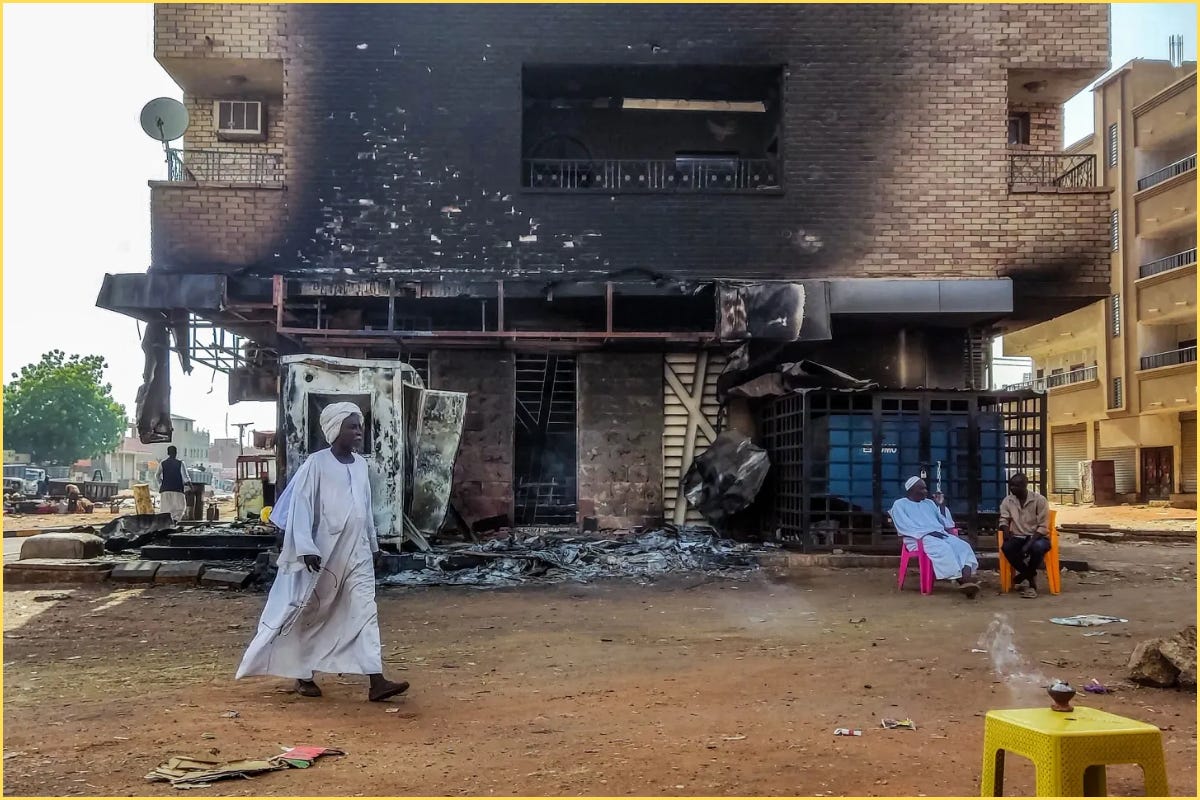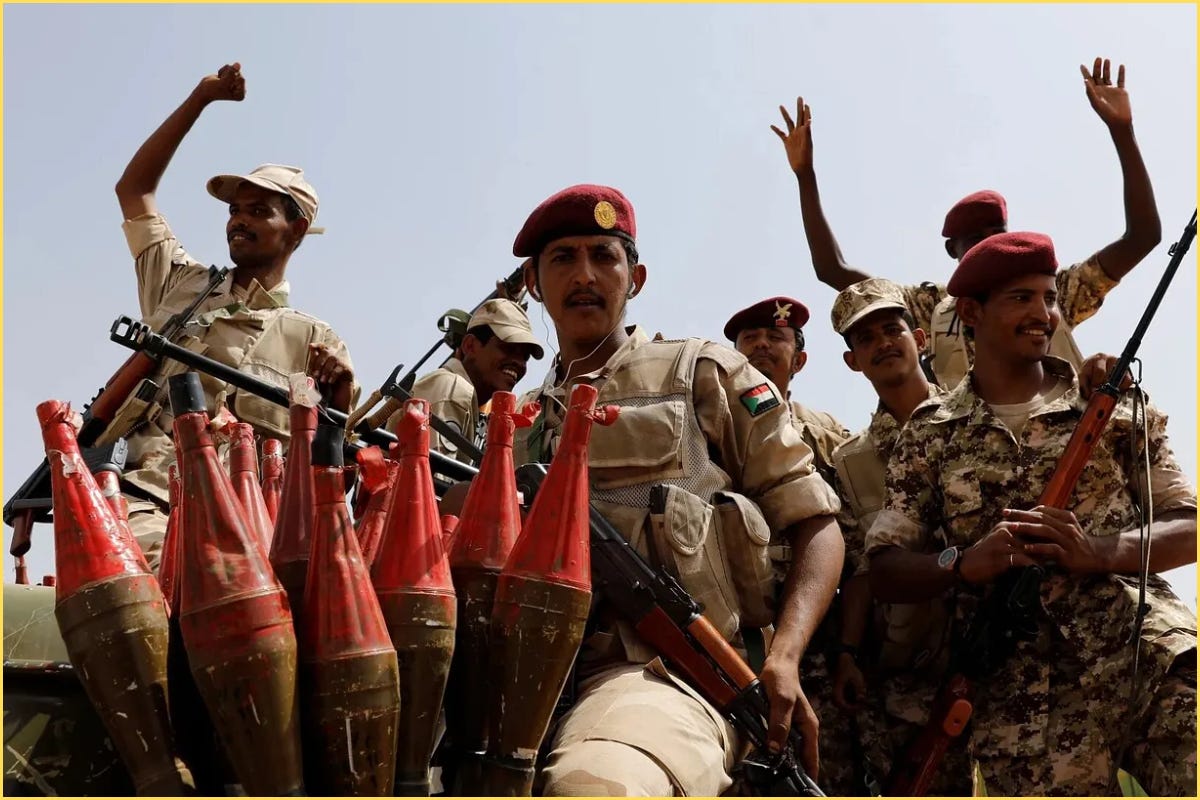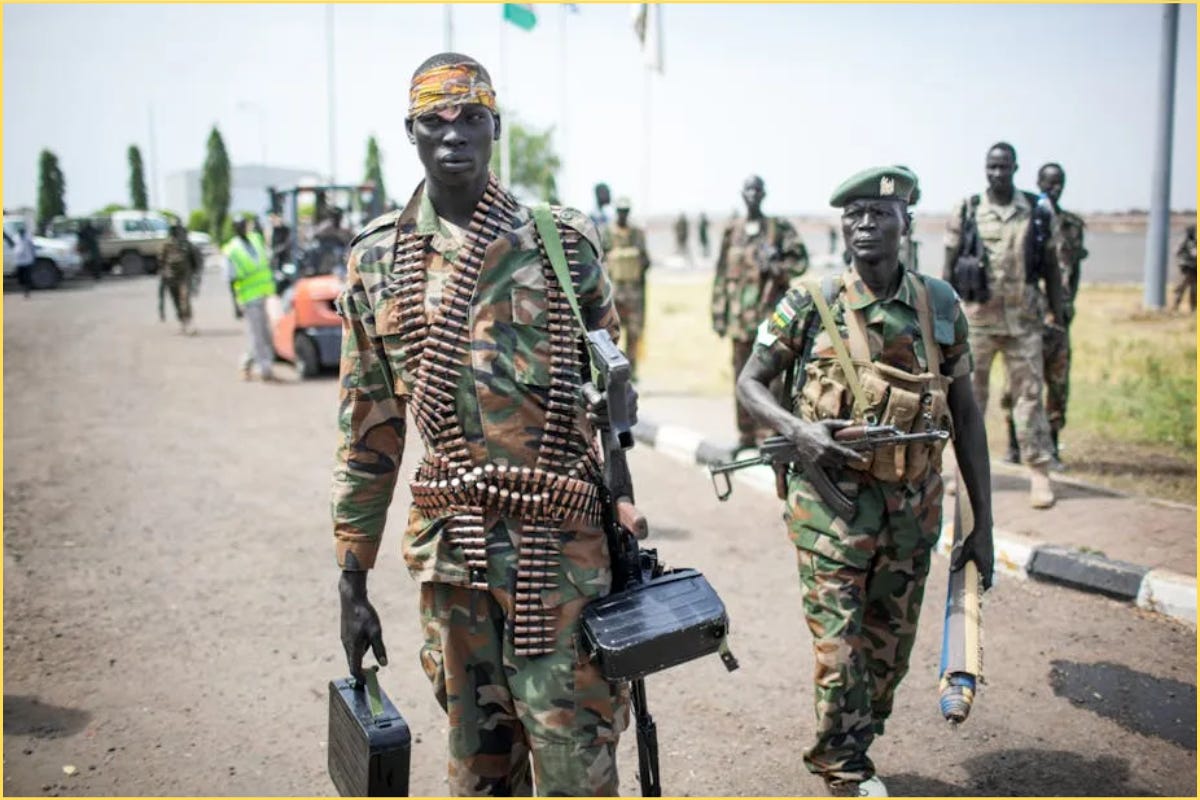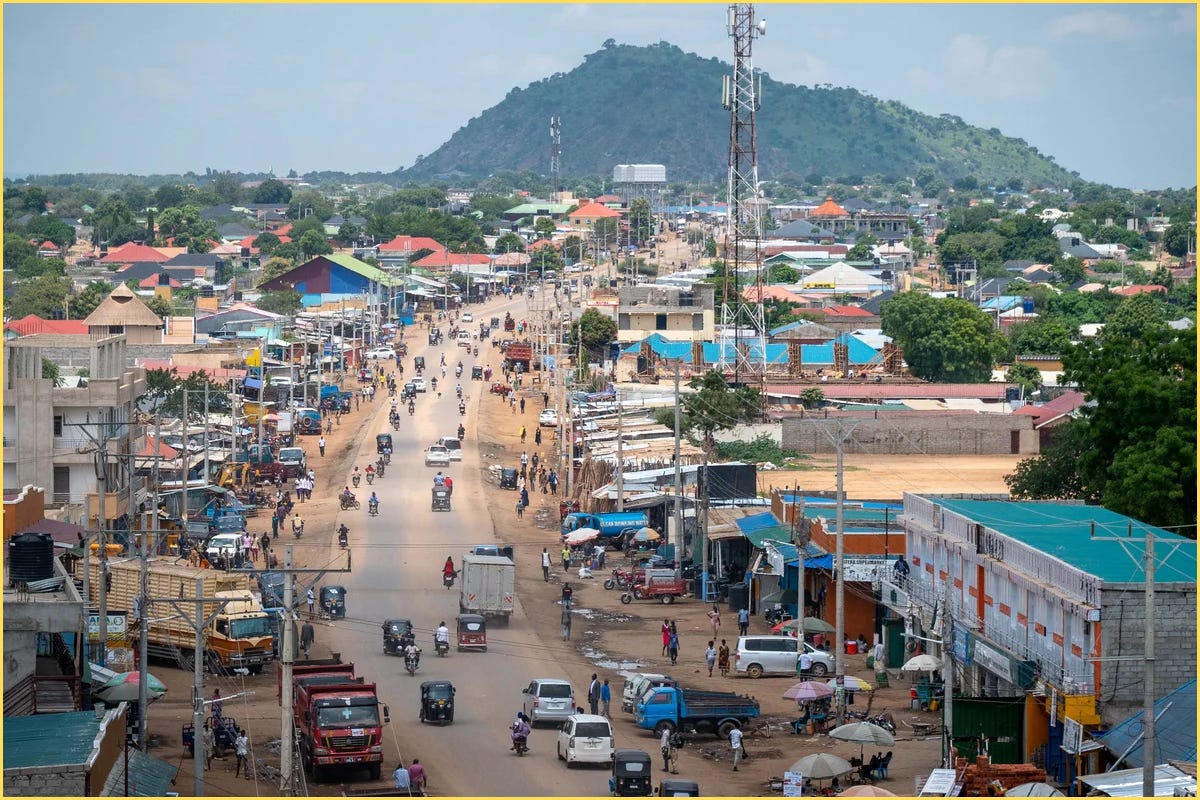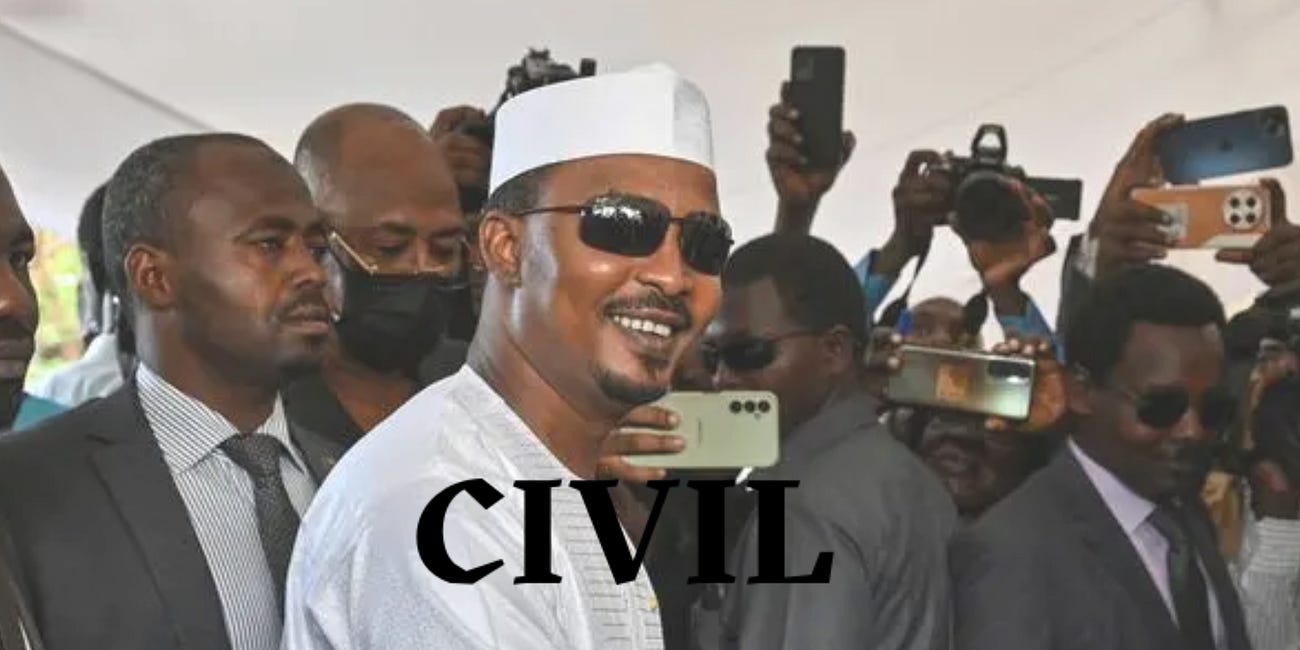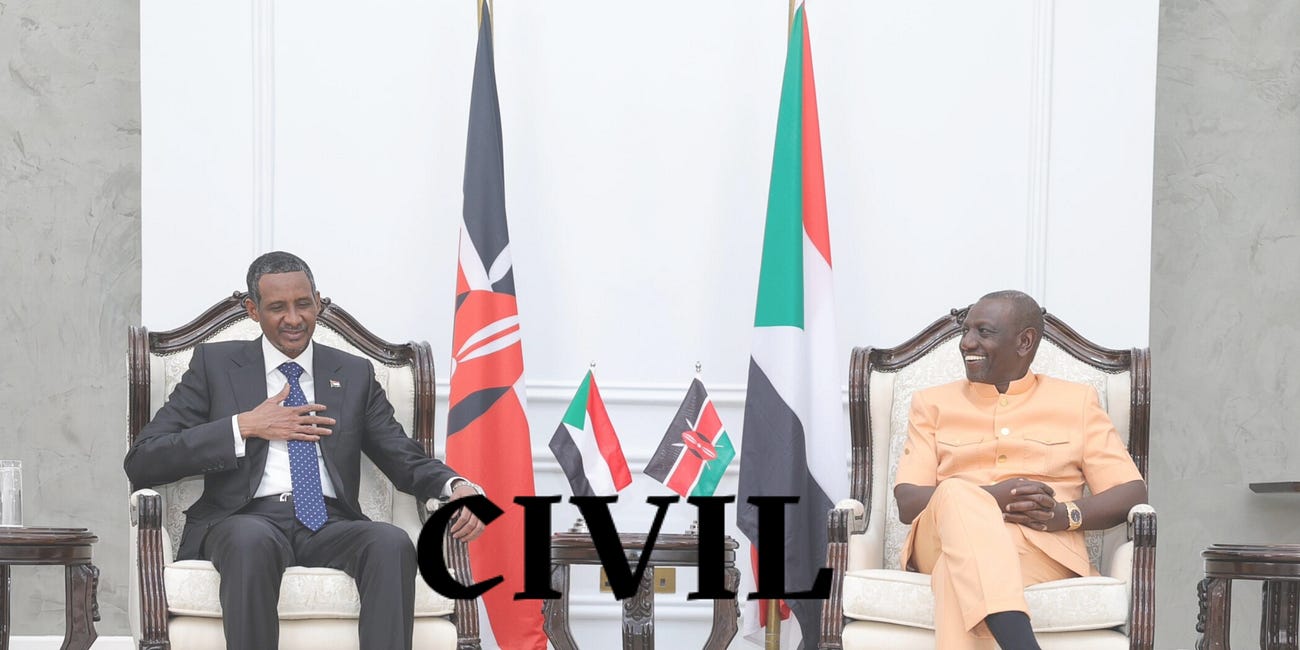sudan is the template for 21st-century empire
the uae is reshaping the region. through gold, armed networks, and a new kind of empire.
Sudan’s civil war is not just a humanitarian catastrophe. It is the frontline of a regional plunder economy, fueled by foreign capital, waged by mercenary forces, and paid for in blood, loot and gold.
Over 150,000 people have been killed. A third of the population displaced. Famine declared. But this isn’t just the collapse of a state. It’s the construction of a new order. One where war is the business model, and the business is extraction.
the rsf: from janjaweed to mercenary cartel
The Rapid Support Forces (RSF), led by Mohamed Hamdan Dagalo (Hemedti) are not a liberation movement. They have no ideology, no program, no endgame beyond profit. Descended from the Janjaweed militias that terrorized Darfur in the 2000s, the RSF is now a privatized army for hire, looting gold, razing towns, and engaging in ethnic cleansing. Not only of non-Arab communities like the Masalit, but also of riverine Sudanese Arabs.
These attacks are not about sect or sectarianism; they reflect the RSF's character as a nomadic, transnational militia with little rootedness in Sudan itself. Many of its fighters come from beyond Sudan, including Chad, Libya, Central African Republic and Niger. Hemedti himself was reportedly born in Chad, though he is often identifies with Darfur, where he rose to power. His familial and tribal networks stretch across the Chad–Sudan border, reinforcing the transnational character of the RSF. This is a militia shaped not by Sudanese national interests but by cross-border alliances and ambitions. For some RSF fighters, their campaigns are not simply only looting however, it is also a violent strategy of territorial and demographic domination, including the displacement of both non-Arab African communities and sedentary riverine Sudanese Arabs who are seen as obstacles or inferiors.
This monster wasn’t born in a vacuum, It was raised by the state. The Sudanese government and SAF empowered the RSF and their nomadic Arab militias, originally as a tool to crush rebellion in the periphery (in Darfur, Kordofan and in the South). Militia fighters were encouraged to settle lands cleared by violence (in Darfur especially). Land was seized through massacre, with the state engineering a new demographic reality by bloodshed. The state outsourced its brutality and reaped the spoils. Now the monster has turned inward, terrorizing Sudan’s heartland. Most of the RSF doesn’t aim to govern territory, only to plunder it: dominating trade corridors, smuggling routes, and seizing literally anything of value. This isn’t conquest. It’s pillage by design.
And behind them: the United Arab Emirates. The RSF’s war is bankrolled by the UAE, which launders Sudan’s conflict gold through Dubai’s markets. Much of that gold originates from mines controlled by Hemedti’s vast business network, specifically through his family’s company, al-Junaid, which dominates Sudan’s informal gold sector. This concentration of resource control has turned Hemedti into both a warlord and an oligarch, feeding the RSF’s war machine through illicit extraction and foreign patronage. In return, the Gulf state gains geopolitical influence and near-total leverage over Sudan’s economy, a grip it tightened long before the war began. From real estate to logistics to gold, the UAE embedded itself across critical sectors of Sudan’s economy, building a platform for deeper extraction. Now, amid the chaos, it simply plunders harder. This isn’t just covert support, it’s industrial policy turned colonial strategy. The war is not an accident. It’s an investment with blood dividends.
a war that doesn’t stop at borders
But the war isn’t staying within Sudan. It’s metastasizing, into South Sudan, Chad, Libya, and beyond. RSF militias have embedded themselves in cross-border networks, linking with actors in South Sudan. The porous frontiers have become ideal terrain for smuggling: barely governed, economically desperate, and strategically located. Here, the RSF doesn’t just hide. It operates, trafficking gold, moving arms, and recruiting fighters.
South Sudanese mercenaries have reportedly been recruited by both the RSF and the SAF in various theaters of the conflict. But while they may serve as foot soldiers, they are rarely treated as equals. Reports detail a two-tier system within the RSF, where Arab fighters are given preferential treatment and South Sudanese recruits face abuse and discrimination. The RSF maintains an ideology steeped in Arab supremacy and anti-Black racism, including toward allied fighters. In a war economy built on plunder and hierarchy, even mercenaries are disposable, especially when they are Black Africans in a militia shaped by supremacist violence.
According to multiple reports, the United Arab Emirates (UAE), under pressure to support the RSF without direct exposure, has allegedly routed military support through South Sudan, including a suspected logistics base disguised as a field hospital in Northern Bahr el Ghazal (same tactic in Amdjarass, Chad). From there, equipment is believed to move overland into RSF-held zones. The RSF’s cross-border presence isn’t symbolic; it’s tactical. Smuggling operations, especially along South Sudan’s porous frontiers, have proceeded with minimal resistance, aided by mutual economic interests and weak governance. While direct institutional ties between Juba and the RSF remain opaque, patterns of tolerated activity suggest a quiet understanding.
These networks are further complicated by the RSF’s coordination with the SPLM–N, which controls key access routes into South Sudan. While claims about RSF activity in Ethiopia’s western borderlands, particularly the Gambella region do exist, they remain thinly sourced. No independent reporting has confirmed sustained RSF presence or operations there, and the evidence is not yet strong enough to draw conclusions about Ethiopian complicity or coordination.
South Sudan’s oil economy, which supplies over 90% of its government revenue, is now a frontline in Sudan’s broader war. The crude flows north to Port Sudan, where RSF and UAE-backed drone strikes have recently crippled infrastructure. In response, the SAF has threatened to shut the pipeline down, to pressure South Sudan into cutting any tolerated or tacit ties to the RSF. The South Sudanese government is now being forced to choose sides. Because, It no longer governs in any meaningful sense. It survives not by managing its territory, but by selling it. One barrel, one corridor, one concession at a time.
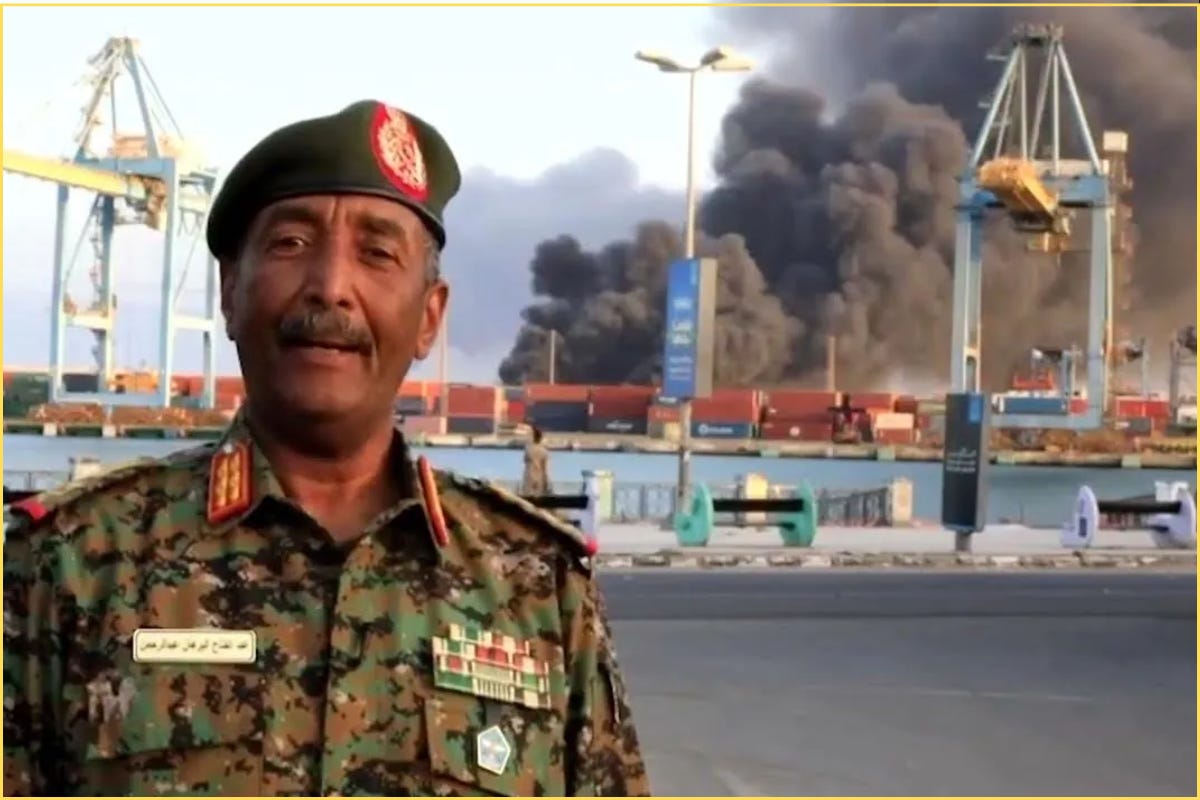
Meanwhile, South Sudan is fracturing from within. President Salva Kiir’s detention of rival Riek Machar and his campaign of barrel bombs and incendiary weapons against opposition strongholds like Upper Nile have reignited civil war dynamics. Civilians are fleeing en masse to Ethiopia, and humanitarian operations are in collapse.
Uganda has intervened and reportedly launched airstrikes in support of Kiir, while Sudan’s SAF backs Machar-aligned SPLM-IO forces. Not out of solidarity, but to sever RSF connections within South Sudan’s political class and to stop it southern advance across Sudan.
What’s emerging is a war nested inside a war, South Sudan as a proxy battlefield in the larger scramble for Sudan and potentially the entire region. Uganda and Sudan are already engaged. But the ripple effects could pull in Kenya, Rwanda and even spill over into the Democratic Republic of Congo, which shares a border with South Sudan and is already a flashpoint of instability and foreign intervention.
China has billions invested in the DRC’s mineral sector, and is already contending with instability from the M23 rebellion. It has so far remained largely aloof from Sudan’s unraveling. But if the conflict spills into Congo, Beijing could be forced to act, to protect its mines, its supply chains, and its strategic foothold in Central Africa. A move that would almost certainly trigger counter-responses from the United States and its allies.
With other players like Angola, Burundi, and South Africa already active in the DRC theater, the lines between civil war, proxy war, and regional war are vanishing. The UAE, Iran, Russia, Turkey and others will not be far behind, and when they come, they’ll bring their mercenaries, drones, and extraction deals with them.
What’s emerging is a layered proxy war, with each country circling Sudan playing its own role. Egypt backs SAF to protect Nile water flows. Iran and Turkey funnel weapons to the Port Sudan-based government. Russia, through successor entities and private military contractors formerly tied to Wagner, supports SAF in exchange for gold concessions. Saudi Arabia publicly maintains a neutral posture, even co-hosting peace talks, but in practice aligns with SAF to preserve regional stability.
Chad and Libya act as rear bases, not just as logistical corridors but as recruitment and smuggling hubs for the RSF. South Sudan, too, has increasingly taken on this role: a permissive zone for RSF smuggling routes, tactical alliances, and backdoor logistics. And as it finds itself in a difficult situation, the same actors fueling Sudan’s war, the UAE chief among them, are poised to deepen their reach. Turning the south into another arena for mercenaries, smugglers, and extraction cartels.
But the center of gravity is undoubtedly, the UAE. The RSF’s violence is financed by Gulf capital, laundered through Dubai’s gold markets, and shielded by diplomatic cover from Abu Dhabi, the seat of the federal government. Dubai acts as the financial engine, the place where conflict gold is monetized and warlords are legitimized through real estate transactions and investments in gold processing infrastructure. But the real power lies in Abu Dhabi, which sets foreign policy, approves arms transfers, and shields the RSF diplomatically. This isn’t passive complicity, it’s a state project: coordinated from Abu Dhabi, executed through Dubai’s financial networks, and sanctioned by the UAE’s foreign policy establishment.
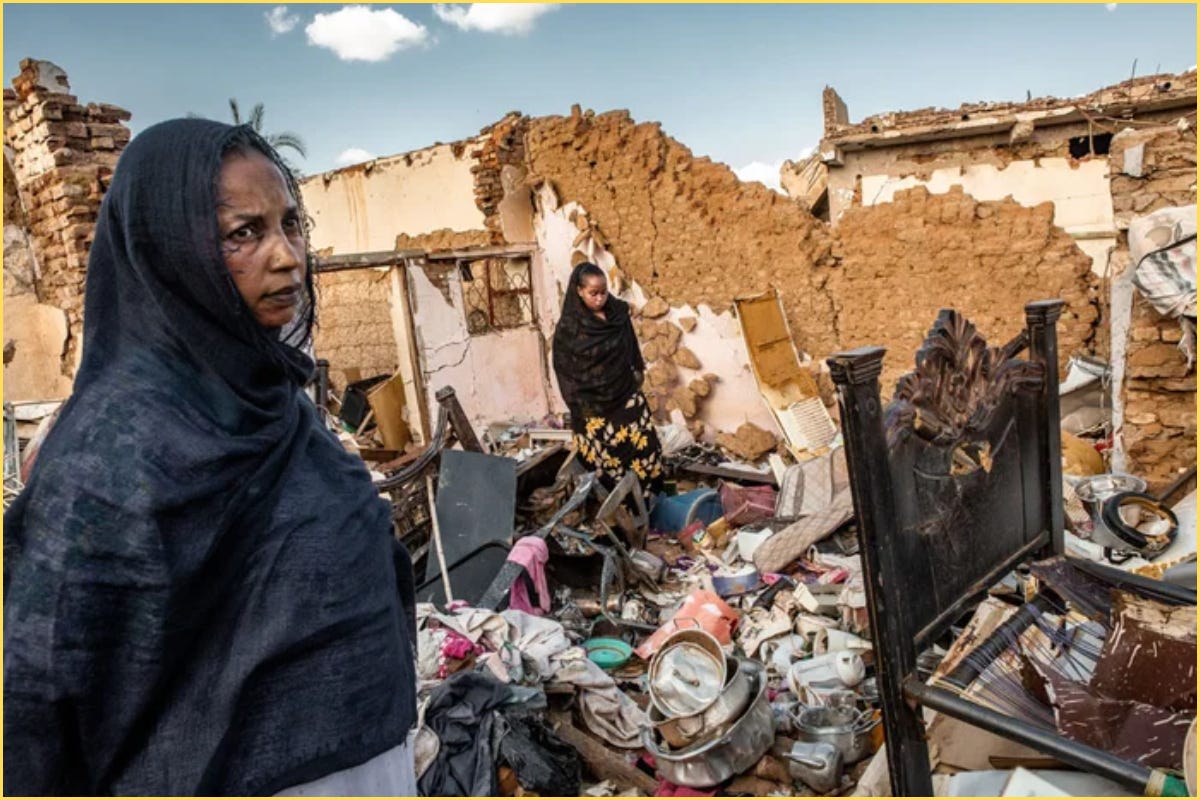
Yes, SAF is no angel. But it is at least embedded in Sudanese society. Tied to resistance committees, local defense forces, and remnants of a shattered civic infrastructure. The RSF is something else entirely: a transnational militia driven by foreign interests and its own appetite for loot and domination. It is not a national army, not a political movement, but a cartel in uniform.
this is what a 21st empire looks like
The humanitarian catastrophe is expanding. But the real crime isn’t chaos, it’s the system designed to harvest it. The RSF’s brutality is the blueprint. The operational logic of a war economy, engineered in Abu Dhabi, laundered in Dubai, and enforced with Sudanese bodies. This isn’t just a failed state. It’s a state under new management, stripped of sovereignty and rebuilt to serve mercenaries, smugglers, and foreign financiers. The war isn’t the absence of order. It’s the enforcement of a new one: brutal, extractive, and outsourced.
The UAE is the new imperial power in Africa. More agile, more brutal, and more economically embedded than its predecessors. The UAE had its grip on Sudan long before the war began, just as it does on a growing number of African economies. But Sudan is the first place where it’s gone further: from influence to occupation, from partnership to plunder. Now it holds the reins, soaked in gold and blood.
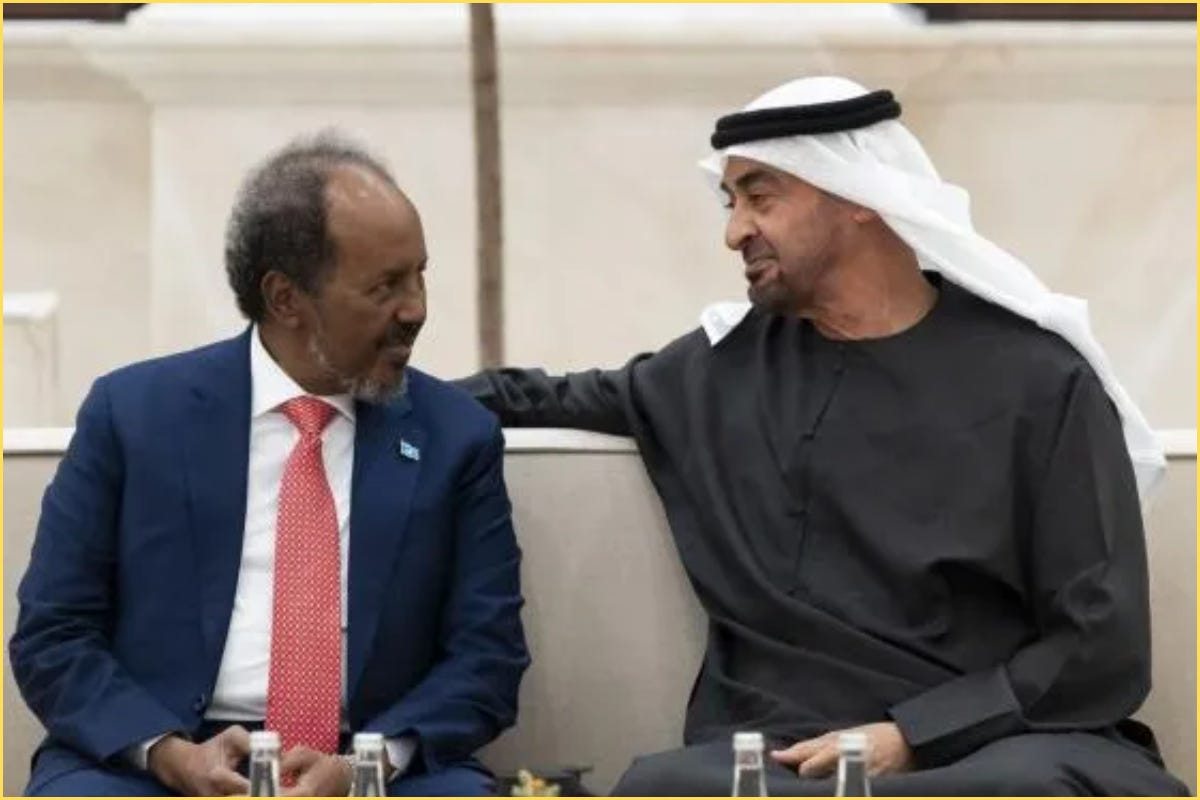
The governments aren’t the only ones who should be paying attention. Citizens across Africa whose leaders are cutting deals with the Emirates should be wary. Because what happened in Sudan didn’t begin with war. It began with deals. With contracts. With quiet partnerships. It didn’t look like conquest, until it was too late. It may not come with the same names or the same weapons. But it will come. Through concessions, through extraction, through a weakness that will be exploited.
Sudan is not the exception. It’s the warning.
Curse the House of Al-Nahyan.
To get the full picture of the UAE’s role in Sudan’s war, check out my investigation for The Africa Review:
Chad is helping fuel Sudan’s war. its own crisis may be next. Read the Chad analysis:
chad is helping fuel sudan’s war. its own crisis may be next.
In Sudan’s civil war, much of the world sees chaos: rival generals, scorched cities, a spiraling humanitarian collapse. But across the border, one of the systems sustaining that chaos sits in quieter…
President Ruto insists Kenya’s role in Sudan is strictly diplomatic. The facts suggest otherwise. Read the full investigation:
kenya’s corridor of complicity
President William Ruto is selling his Sudan policy as peace diplomacy. But Kenya’s embrace of the Rapid Support Forces (RSF), the militia accused of genocide in Darfur, has less to do with peace and …



